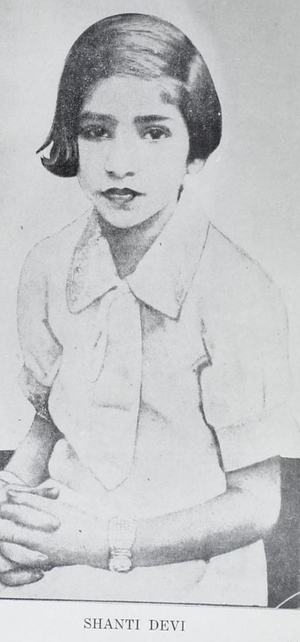Discover Your Roots
SIGN UPDiscover Your Roots
SIGN UPShanti is a female name of Indian origin, meaning "Peace" and "Calm." In Sanskrit, it embodies inner peace and spiritual strength. This name has a rich cultural significance in Hinduism and Buddhism, often associated with peace mantras and prayers. Notably, several prominent individuals bear this name, including Indian actress Shanthi, and it has also been featured in literature, film, and music. Shanti's influence extends to the animal kingdom, as the name was given to an Asian elephant gifted to the United States. Additionally, there are various places and organizations named after Shanti, reflecting its widespread impact. Overall, Shanti symbolizes tranquility and spiritual fortitude, making it a meaningful and revered name in Indian culture.

Shanti Devi, also known as Lugdi Devi in her alleged past life, was an Indian woman who claimed to recall her previous life, sparking widespread interest in reincarnation research. Born in Delhi, India, she began sharing memories of her past life as a young girl. At the age of six, she attempted to reach Mathura, claiming it was her real home. Despite initial skepticism, Shanti Devi's detailed knowledge of a merchant named Kedarnath Chaube in Mathura and his deceased wife, Lugdi Devi, led to the recognition of her as the reincarnation of Lugdi Devi. Mahatma Gandhi supported her claim and set up a commission to investigate, concluding that she was indeed the reincarnation of Lugdi Devi. Shanti Devi's story continued to attract attention, and she was interviewed by various researchers, including Ian Stevenson and K.S. Rawat. Despite the controversy surrounding her case, Shanti Devi's story remains a subject of interest in the field of reincarnation research.

Veronica Shanti Pereira, born on September 20, 1996, is a prominent Singaporean track and field athlete known for her remarkable achievements in sprint events. Pereira has set multiple national and regional records in various sprint distances, including the 100m, 200m, 4 x 100m, and 4 x 400m. Notably, she holds national records for the 100m (11.20s), 200m (22.57s), and 400m (53.67s), along with several other impressive athletic feats. She demonstrated her talent at a young age and continued to excel throughout her career, earning accolades and breaking records in youth, regional, and international competitions. Pereira's dedication to her sport and exceptional performances have garnered widespread recognition, solidifying her status as a leading figure in Asian athletics. Additionally, her educational journey, from studying sports and leisure management to eventually graduating in 2021, reflects her commitment to both academic and athletic pursuits. Pereira's remarkable achievements and ongoing success have positioned her as a trailblazer and an inspirational figure in the world of track and field.

The Shanti Sena, also known as the "Peace army," was a non-violent group of followers of Mahatma Gandhi in India. The term "Shanti Sena" was first coined by Gandhi to conceptualize a nonviolent volunteer peacekeeping program aimed at minimizing communal violence within the Indian populace. Inspired by this movement, other groups such as the World Peace Brigade, Nonviolent Peaceforce, Swaraj Peeth, Peace Brigades International, and participants in the Rainbow Gathering have emerged, serving as a basis for the practice of Third Party Non-violent Intervention. The words "Shanti" and "Sena" are derived from Sanskrit, with "Shanti" meaning peace and "Sena" meaning army or a drilled band of men. Despite criticism for its connection to militarism, Gandhi attributed strong metaphorical and spiritual qualities to the term "sena" as used in the Hindu vedas. After the Gandhian era, the Shanti Sena has taken on various incarnations, with separate groups developed by Vinoba Bhave and Jayaprakash Narayan based on their interpretations of it. The Shanti Sena program has also been institutionalized into India's Gandhigram Rural University and is active in Sri Lanka as part of the organization Sarvodaya.


All images displayed on this page are sourced from Wikipedia or Wikimedia Commons.We use these images under their respective Creative Commons or public domain licenses. Wherever applicable, author attributions and license information are provided. If you believe an image is used incorrectly or outside its license terms, please contact us so that we can review and correct the issue.